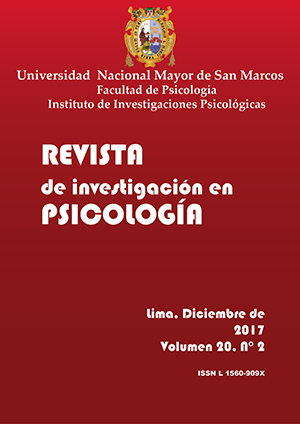Cognitive skills and executive neuropsychological functions in bilingual children (native language- castilian) and monolinguals castilian
DOI:
https://doi.org/10.15381/rinvp.v20i2.14039Keywords:
Bilingualism, executive neuropsychological functions, sociocultural realityAbstract
The study sought to establish whether there are differences in levels of cognitive skills development and executive functions in bilingual children and Spanish monolingual children, belonging to the same socio-economic level. Twenty students from 5th and 6th grades of the Community of Socos were examined; 24 students of 5th and 6th grade of the educational institution "Virgen del Carmen", Pilacucho, Huamanga; 24 students from the I.E. intercultural bilingual: "Shipiba Community" in Cantagallo, Lima; and 18 students of 5 ° and 6 ° degree of "Santa Rosa de America" of Callao; with ages ranging from 10 to 12 years.
They were examined intelligence with the Raven Test and executive neuropsychological functions with some subtests of BANFE (Flores-Ostrosky, 2012). The results showed significant differences between the groups, both in cognitive functioning and executive functions. The students who yielded the lowest in both variables were the children of Socos, Ayacucho, rural and Quechua-speaking. Then the students of Huamanga, capital of the department of Ayacucho. The best performers were students from Callao and children from the Shipiba community of Cantagallo-Lima, influenced by other types of bilingualism.
It is noted that dysortogenic factors: extreme poverty, social marginalization, and the problem of Quechua-Castilian bilingualism, would be related to cognitive development and executive functions in children. In conclusion, we found significant differences between groups of students from different socio-cultural realities at the level of executive neuropsychological functions and cognitive abilities.
Downloads
Published
Issue
Section
License
Copyright (c) 2017 Ricardo Canales Gabriel, Esther Velarde Consoli, Juan Ramírez Mendoza, Susana Lingán Huamán

This work is licensed under a Creative Commons Attribution-NonCommercial-ShareAlike 4.0 International License.
THE AUTHORS RETAIN THEIR RIGHTS:
a. The authors retain their trademark and patent rights, and also on any process or procedure described in the article.
b. The authors retain the right to share, copy, distribute, execute and publicly communicate the article published in the Journal of Research in Psychology (for example, place it in an institutional repository or publish it in a book), with acknowledgment of its initial publication in the Journal of Research in Psychology.
c. Authors retain the right to make a subsequent publication of their work, to use the article or any part of it (for example: a compilation of their work, lecture notes, thesis, or for a book), provided that they indicate the source. of publication (authors of the work, magazine, volume, number and date).























